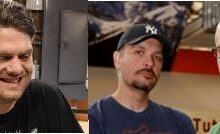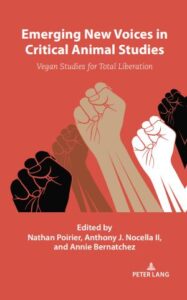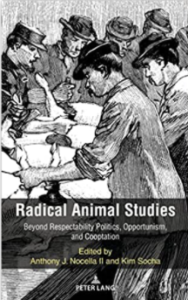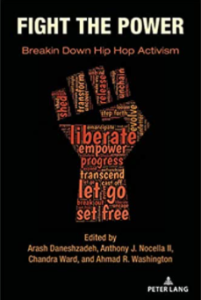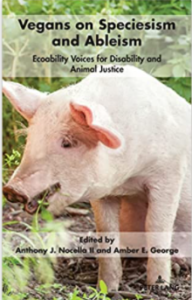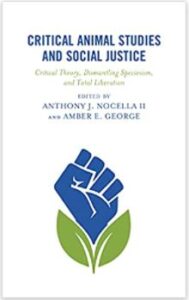Scholar-Activist Spotlight with Johnny Lupinacci – August 2019
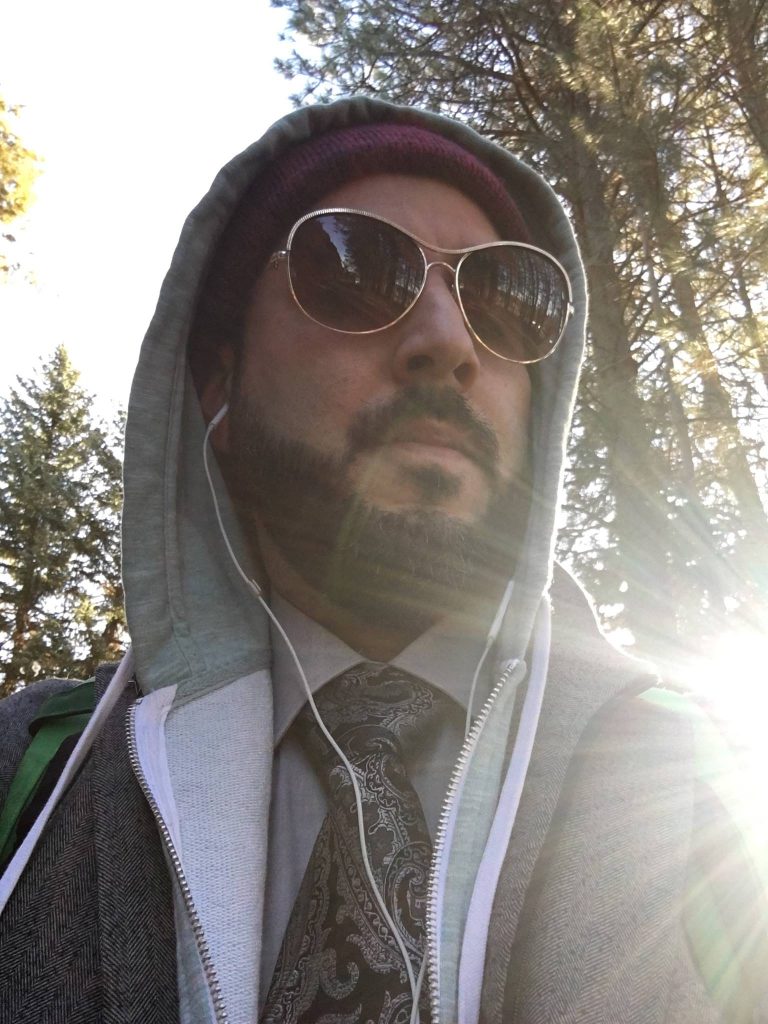
Annie C. Bernatchez – How and why did you become an ethical vegan activist and adhere to a CAS perspective? What does it mean to you and how do those ethical decisions influence your academic career.
Johnny Lupinacci – I think this is hard for me to pin down to one particular moment. I had for a long time been a vegetarian and mostly vegan. I had been heavily influenced by animal and environmental activists in my teenage years and learned a lot about that kind of political activism at punk shows and from deadheads. Flashing forward to learning more about CAS, I was a hardcore vegan graduate student teaching high school in Detroit and had become deeply interested in the role of education in promoting social justice and sustainability. I had been working with some amazing activist educators practicing critical pedagogy and working locally to learn from elders in the community how we might better educate and empower local youth. I learned about CAS from a friend Richard Kahn who presented about it at a conference and was at the time writing about ecopedagogy. I immediately felt like it was the first good fit for the theoretical perspectives I was working through as I was beginning to make sense of my research focus in my graduate studies. At around the same time, I had been living near and learning from Detroit farmers at the D-Town farm. Leaders in the Detroit food movement like Malik Yakini had influenced me a lot to consider the political resistance in food choices and how social justice issues were entwined with animal and environmental justice. Striving to live a life of daily practice to not reproduce oppressions like sexism, racism, classism, anthropocentrism and later learning more about ableism, it made sense to reclaiming some agency from the State regarding the production, dissemination, preparation, and consumption food. It became clearer to me through the mentorship of my friends in Detroit that something as intimate as what you put into your body—or offer to others to put in their bodies—ought to be framed in an ethics of thoughtful compassion, anti-racism, anti-sexism, and anti-speciesism.
The CAS principles resonated with this and so as a graduate student disinterested in most theory that ignored the importance of addressing human supremacy in relationship to and along with white-male-heteronormative-abliest-classest culture and the violence of the State in maintaining unust power and privilege, I really turned to learning more about CAS an influence on my scholar-activism. As a scholar-activist, I would say my ethical decisions (including food) is founded in anarchism and mostly around the politics of eating in ways that are situational, local, and in supportive of living systems. What I don’t ever do is police others! This is hard for a lot of vegans, especially animal rights vegans, who are often the first to assume an authoritarian position—which to me is a slippery slope to a kind of fascism I’ll never be fond of. I do admire and value hard line politics but not at the expense of requiring or reinforcing a State—or any individual despot—to do the enforcing of such choices. I think a lot of people will not like that statement and I’m ok with that. I think it’s critical we disagree and have dialogue about our differences. The goal for me is not to control others but rather to engage in a thoughtful decentralized action to get to it and eat, share, and engage in a multispecies politics of as much care and consent as we can offer. I don’t care how vegan anyone fancies themselves they are living because the of living things they consume from the Earth. So, I hate the moral argument of sentience. I’ll always say vegans that don’t consider the implications of factory farmed soy or genetically modified foods are missing the point. For me, it is all about reducing oppression on the planet and increasing possibilities for sustainability. This means local markets, shared food, culturally relevant and geographically responsive foods that don’t rely on the exploitation of any living thing for our survival. I think it was put nicely by radical comic book artist Seth Tobocman who titled a book You Don’t Have to Fuck People Over to Survive and I’d say that is also importantly true regarding food choices. We don’t have to fuck over anyone, or anything, in order to survive. So, putting that to practice given that we do need to eat—why not eat with ethical consideration to one’s politics and not be complicit in the forced politics of the State.
As far as how CAS has influenced my academic career, it’s been a wonderful regular reminder and commitment to keeping in mind the intense importance of considering the complexity of this work. It’s also been a network of friends and that is often lost in academia. Academia feeds egos and anyone can quickly find themselves in spaces that are overwhelmingly filled with high pressures to compete and conform—to fuck people over to survive. I’d say CAS has helped me with having good scholar-activist friends who remind one another of the importance of critical friendships and of solidarity in our scholar-activism. It’s fine to disagree, in fact it’s really important but academia is riddled with all kinds of individualism and elitism. I think it was, and is, important to me to also work in the intersections of theory and practice and being a teacher educator has always helped me in my academic career because I write about how radical critical theory influences—or could and ought to—influence how it is we teach and learn together in our communities. I think Anarchism and CAS; together with Critical Disability Studies, EcoJustice Education, and Ecofeminisms have played an important and complimentary role in setting my intellectual compass and because I work in education its grounded by the direct actions of what we do daily with teachers to make real changes in how we educate children. I am also pretty much a newbie to the academic realm and have only been in a fulltime university position for six years now.
ACB – As a young academic, how do your colleagues understand your CAS perspective? What are the frequent questions you are asked? Do your colleagues and the University agree with the anarchist pedagogy you are promoting, why?
JL – Some colleagues do seem to understand and value the CAS perspective and others absolutely do not. Among those that get it, there are those that respect it and mostly leave it be and then those that absolutely hate it and belittle it any chance they can. I think that’s how dominant ideology works though, right? I mean the people that get it and see it as a threat to their blatantly human supremacist work often are those first to put CAS related work down or to attack it. This is the sad part of academia, but also part of the gig. I wrote about this in a chapter in Anarchism and Animal Liberation: Essays on Complementary Elements of Total Liberation where I wrote a letter to my colleagues of past, present, and future so I won’t go too far into it here but the short of it is haters are going to hate—especially the ones who don’t want the inconvenience of change.
Oh no, not a vegan anarchist! It’s hit or miss how colleagues relate to, agree with, or disagree with anarchist pedagogies. I mean the most common questions are “so what do you eat?” or “are you offended because I eat meat” but then there are more genuine questions like “how does anarchism fit into the academy” or “Do you really think total anarchy is the answer?” (Insert huge sigh and deep breath) I have to regularly explain that anarchism is likely not something they are quite familiar with and they likely have some mixed-up perceptions about it. It’s not anything goes but rather it’s about learning to make decisions together in ways that don’t rely on a State, on authoritarianism, or default to a socially (thus human) constituted value-hierarchizing of everything. It’s about decisions being made by those directly impacted by the decisions being made and that not being only informed by humans. It’s about consent, consensus, mutual aid, and equity among all species. It’s not about rules, laws, policing, dominance, or majority rule. I don’t always lead with “the A word” but rather just with full transparency how I teach and engage as much as I can with resistance to reproducing authoritarianism and centric politics. Most of the time this is anarchist. The University itself is not at all anarchist but it does provide a context for which anarchism can be studied and practiced. So, I guess sometimes the best, and to some the worst, part about anarchist pedagogies is that they decenter the power of professors and empower students and communities in ways that often those in power are not comfortable with. I guess for me on the days I’m really questioning if Universities can be spaces to support actual change I remember the importance of interrupting spaces where dominant assumptions are reproduced and of the importance of being unapologetically utopian and committed to what a future from the rubble of current dominant cultures might be. In particular, it helps that I’m in education where it’s my job to think about, and research, how me might learn to teach differently and with attention to multispecies justice AND sustainability.
ACB – What do ecojustice and ecopedagogy mean to you? How and why are they relevant to CAS principles?
JL – This question is really a great question. I could go on at book length about this and have particularly about EcoJustice (see EcoJustice Education: Toward Diverse, Democratic, and Sustainable Communities). In short, EcoJustice and Ecopedagogy are very similar with some minor differences that I think, while different, complement one another and both work quite well with CAS principles. Both those frameworks, EcoJustice and Ecopedagogy, see no separation between the root causes of social, ecological, and environmental justice and both frameworks direct educators toward a cultural shift in how, in particular Western Industrial/Capitalist Culture, reproduces a particular kind of colonial mindset rooted in domination. Ecopedagogy, is a framework introduced by Richard Kahn’s work to bring the work of Freire and other critical pedagogues to light as he and other critical pedagogy scholar-activist educators urge for “planetary citizens” and an education toward such a consciousness through critical pedagogy that recognizes value for all life. Kahn’s work is incredibly important because really there continues to be a lack of attention to the connections between the health of diverse species and the planet with goals of social justice and Kahn makes a clear call for and provides a framework through ecopedagogy for how critical pedagogy should include close ethical consideration and actions taken in support of all life on the planet.
EcoJustice Education is a framework akin to Ecopedagogy and grew somewhat simultaneously but in direct connection to the work of C.A. Bowers who introduced eco-justice as a discourse that emerges from deep ecology and linguistics. Similar to Ecopedagogy, EcoJustice addresses the interrelated nature of social and environmental justice but its focus is more on the linguistic roots of what Martusewicz, Edmundson, and Lupinacci refer to as Discourses of Modernity and the ways those discourses work to culturally constitute, and reconstitute, value-hierarchized binaries in Western industrial culture—and in particular in schools increasingly around the planet. The differences between these two frameworks, I’d say are really minor and both frameworks are primarily aimed at recognizing and valuing diversity and call for interrupting and abolishing problematic cultural assumptions at the roots of injustice and environmental degradation.
I think a lot of people read or hear “eco” and think these frameworks are only about what is often hyper-separated in a Western dualistic and hierarchical binary of culture/nature and folks think about land, trees, waterways, etc.—which they definitely include. However, both Ecopedagogy and EcoJustice recognize ecology as inclusive of humans, animals, insects, soil, oceans, rivers, glaciers, mycelia, forests, etc. In this sense, the “eco” includes the diversity of life contributing to the existence of communities around the planet and urges for educators to take action in classrooms and any learning spaces toward learning to stop harming one another and the planet. Furthermore, these frameworks call for educators to think and act more in accordance with more valuing diverse ecocentric ethics—which both frameworks note as existing around the planet in diverse epistemologies that are often devalued (and even being destroyed) in the globalization of Western industrial culture. In short, both of those frameworks are predominantly for educators who carry into teaching deep cultural assumptions that gone unaddressed will continue to reproduce social injustice and environmental degradation. For example, when middle and upper class white women in the US (which is the majority demographic of who are becoming teachers but this applies to all becoming teachers) don’t learn to, and actually commit to, addressing privileges afforded to particular groups of people because of a long legacy of White supremacy, Ableism, classes, sexism, and human supremacy then they bring those assumptions into the classroom and enact the kind of problematic systemic injustice we see too often in schools and communities. Especially, given that most schools are designed with the intention of sorting children and are based on an incredibly colonial assumption that a so-called education (which is a curriculum of white-male-ableist-human supremacy if gone unchecked) is progress or better than diverse understandings and cultural knowledges. I’m not saying that education isn’t important but I am saying that schooling or the kind of education dominant in Western industrial culture is extremely problematic and with every ounce of effort needs to be confronted, rethought, and or resisted. This distinction between schooling and education is an important one. I don’t hold much hope that reform of schooling will result in much change on the planet but I do hold great hope that from the ruins and rubble of the institutions of schooling that education in diverse ways that are situational, local, and in support of living systems will emerge and prevail. Modern schooling is really not that old on the planet and in the relatively short amount of time its existed it has managed to present as the only option for education when in reality humans, and other species, have been teaching and learning before schooling and will continue beyond its problematic existence. I know people like to cling to the hope that schools will be the change and I think they play a part as the transform radically but part of that transformation would reconstitute them so radically they wouldn’t exist as we currently experience them. I say this pointing folks in education to learn from diverse decolonial efforts from indigenous educators around the planet, to Black Lives Matter activists working to support more anti-racist teaching, and for more reading about this deschooling kind of work folks might check out Ivan Illich’s work in particular his book Deschooling Society. Of course, none of this is new! Whether we talk about freedom schools, free skools, collectives, or examples like the Barefoot College in Rajasthan or the kind of examples Keith Basso shares in Wisdom Sits in Places, we can acknowledge that these calls to resist the violence and oppression reproduced in Western industrial schools aren’t coming soley from EcoJustice or Ecopedagogy scholar-activist educators but rather that those frameworks are insurgent pathways for educators deeply entrenched in institutions of higher education learning to be teachers and I’d say those frameworks offers students a way toward learning from education for and from communities who resist Western industrial culture.
Now as for the relevance to CAS principles, both EcoJustice and Ecopedagogy call for educators learning to recognize and resist the way human supremacy together with Eurocentric colonial assumptions about domination (ie classism, sexism, racism, ableism, and heteronormativity to name a few). They are informed heavily by CAS and I think they bring attention from educators to CAS work. Recently, I was having a conversation with CAS scholar-activist Helena Pedersen and she and I were discussing how while CAS is growing quite fast in activist communities and that those growths were seeming to crop up in higher education around in areas of rights, law, philosophy, anthropology, and sociology but yet there seems to be a slow movement in education. I think this is where EcoJustice and Ecopedagogy come in and are really seeding that movement and closely aligned with CAS principals in educational spaces. The difference is that most CAS scholarship focuses on animals (which is fine)—although there are exceptions from specific groups like ICAS and other intersectional activist groups that do recognize the connections between animal liberation and the abolishment of social injustices and environmental degradation. EcoJustice and Ecopedagogy as well as other ecocritical frameworks explicitly call for a multispecies justice and extends that call to include all aspects of the environment and in education. I guess the short answer is that EcoJustice and Ecopedagogy are akin to CAS—like groups of radical folks taking action in both higher education, community activism, and PreK-12 classrooms. Now, I will end my response to this question saying that I’m really excited about Critical Animal Pedagogies (CAP) and the associated Radical Animal Pedagogies which grew out of mainly Anthony Nocella in ICAS recognizing that some CAS scholarship wasn’t quite that radical anymore and in particular growing from ICAS and ongoing dialogues among the diverse members it became important that CAS scholars-activists recognized education as a central part of the CAS activism and so those bodies of work are inspiring and I’d say draw on frameworks like EcoJustice, Ecopedagogy, and other critical frameworks.
ACB – Having published many articles and books and lectured for many years, what would you advise young scholar-activists? What are your best and worst experiences as a scholar-activist who advocates for the end of nonhuman animal oppression?
JL – I think initial my advice is to read a lot! I mean read a lot and widely with attention to diverse authors. Read academic work but also read zines, blogs, listen to music, watch films, etc. I think the more we read the more we learn and develop our understandings for the complex work we are teaching and writing about. I think in addition to reading a lot, it is just as important to find one’s writing process. We are all quite different in our process. Some folks I talk to write daily or they binge write in more of a retreat style or weekend time block. I know enough now to recognize that many of the most important and underrepresented voices in critical work are often those who have very little time to write and so it’s important to acknowledge that and to help create spaces for those voices to write and publish. That can be incarcerated authors, parents, or any of the growing number of radical scholar-activists working endless hours to survive and keep their heads above water financially, etc. It’s also about recognizing that knowledge isn’t only in writing or coming from those with a certain command of the conventions of the Queen’s English.
Read a lot, find routines for writing, and be open to learning from and with diverse voices and species. Really commit to learning from those not like you—whether that be gender, sexuality, race, class, ability, and/or species. Listen closely to their diverse experiences and commit to the work of abolishing the ways that they experience injustice often as a part of upholding the privileges many of us take for granted as part of everyday life. So, I think the other part of advice I’d offer is to be genuinely willing to let go and actually work toward that change. It’s one thing to talk to talk but it’s entirely another thing to talk the talk and walk the walk.
I’m not
sure of my best and worst experiences in this particular line of work. I think
over all my best experience is being in relationship with the growing network
of diverse scholar-activists doing this work and seeing how those networks
really do matter and make a huge difference.
I think my worst is pretty regularly being faced with the immense
surveillance although even that isn’t the worst because as activists we go into
this work aware of what we put out into those technologies. I think the first
time I realized I would be getting hate mail and threats from vegans or animal
rights folks was pretty intense. I think hate mail in general, especially when
its threatening can be scary; but it hits hard especially when it’s from other
radicals who are stuck in the mentality of policing radical work. Before
learning to let the haters just hate and not shut you down it was certainly a
low for me in this work. I mean I’ll always still read a critique or call out
from a fellow radical scholar-activist because that’s how we learn, but there’s
something to be said for the effectiveness of calling into conversation versus
making threats.
I think another low point is realizing how powerful the Meat, Dairy, and
Factory Farming Food and Drug industry is. I mean that shit is sobering quick.
So, without going into too much detail I think when any of us potentially threaten
profits for these industries it’s pretty quickly we find out how powerfully
connected to the criminal injustice systems of human, white supremacists and
heteropatriarchal governance. So, it can seem relentless and impossible to make
a difference. Yet, the network grows and the planet’s capacity to support
current dominant Western industrial culture is running out. So, we’ll see what happens. I guess that’s both a low and high point of
this work—the pockets of diverse species of activists on the planet are
resisting in more and more diverse ways.
ACB – Gender inequalities are well known in academia, as a white man you have privileges when working with non-white-men fellow academics, how do you cope with your status while also defending an anti-oppression perspective? Do you have any advice for men in your situation?
JL – Gender inequalities sure are prevalent in academia. Academia is by no mistake white male elite dominated. I mean read back to the earliest conceptions of the University and the history is riddled with Patriarchy and classism. I think of two really important books for me still to this day are Carolyn Merchant’s Death of Nature and Susan Griffen’s Women and Nature as the both really make apparent the epistemic roots of gender and dominator mindsets in academia and in so many other spaces in Western Industrial communities. I think also being part of activist communities in Detroit and surrounded by Feminist Anarchists (those two words should be redundant but that is an entirely related but different conversation and necessary because of the oxymoronic existence of Patriarchal Anarchists) helps remind me of my responsibility to addressing and not reproducing the kinds of privileges I otherwise have because of the sexism and racism embedded in academia and much of heteropatriarchal white culture.
I’m not sure what to say other than it is work all the time but it’s important self-work; it’s about asking in nearly every situation: “How am I working today, or in this moment, in ways that are directly anti-racist, anti-classist, anti-ableist, anti-fascist, anti-speciest, and anti-sexist, etc…?” It really is about doing more than acknowledging it, although acknowledgment is a starting place. It’s about acknowledging it and learning to do differently. Oh, and it’s not the job of those being oppressed to teach us to do better—that’s our task. It’s our job to really rethink our relationships and how we (I’m now referring to other men in my situation) choose to work toward ending things like sexism or not-the latter being unacceptable in my opinion. I know a lot of “woke” dudes who benefit because they say they are “woke” and don’t do shit about the actual injustice. That’s one way this works. Again, it’s not enough to talk the talk, we (again men in my situation) have to both talk the talk and walk the walk. Especially, when one way privilege works in academia is that it’s easy—and there’s a long history of it—for those in positions of power to advance by co-opting and incorporating the lived experiences of those in real struggle into their own work. In other words, there are a ton of people who write about the suffering of others and end it at that. Or men who claim to be pro-feminist or feminist but then don’t do a thing to increase the number of women, and women of color, to positions of power and support those women unapologetically and with real support like equal pay, real acknowledgment of reproductive rights, and not in objectifying or paternalistic ways. The same can be said for addressing white and human supremacy.
I think a lot of men, especially white dudes, struggle with this more than they admit. So, it’s also about committing to the work and realizing its not simple work—it is real work and mistakes will be made. However, it’s no longer—nor should it be—acceptable for “the boys will be boys” mentality to be an excuse. We know too much and owe too much to equity and social and environmental justice to ignore sexism, racism, classism, ableism, or heteronormativity when we are at work, home, or out in our communities. My direct advice is for white dudes to confront their white heteropatriarchal privilege and not to cash in on that confrontation; it should be part of the process of doing the work…not the work. Some more material answers should be that we all (again fellow men in my position) need to support directly the hiring of diverse scholars, of admitting and supporting to graduation diverse students, to valuing (not co-opting) diverse epistemologies, to stepping back a bit and asking more of our peers. For example, when we write we should critically ask who it is we are citing in our work. When we are asked to contribute to a book, a special issue, a conference panel or anything we ask “Who else is participating and here is a list of a few more folks who are just as or more qualified than I to speak/write on this issue?” And, always genuinely be willing to offer that space up. Also, the politics of citation is real. Cite diverse authors widely and engage in their work authentically. Lastly (speaking directly to men especially who look like me or even whiter or more masculine) stop being the problem…stop shooting up places, stop raping, stop thinking everything is yours to have or that you deserve it all…stop thinking that you know everything, that you are in charge, you don’t and you aren’t so just stop and relearn how to be in the world in ways that you exist not as the problem but as part of ending this awful moment we are in. I think when we start working toward the freedom and equity for all species as part of social justice that work begins often with ourselves (especially as white men) and how we can stop doing what we do and start doing better by those around all no matter who or what they are.
ACB – As the ICAS executive director of publications, where should future publications be oriented to ensure a critical and practical reflexion towards nonhuman animal liberation?
JL – I think it’s important to support a multitude of publishing
options for scholar-activists. The Journal
for Critical Animal Studies (JCAS)
and the Journal for Green
Theory and Praxis are a
few that come to mind directly as related to ICAS. I’d also say Critical
Education housed
at UBC is open access and long been supportive of radical work for those
thinking about this work in relationship to education. I think also any of the
ICAS book series are great and always a wonderful way to connect with other
scholar-activists publishing. I’d love it
if more work like that coming from folks thinking about animal liberation was
in venues like Truthout and Common Dreams so submit there as well. I also think zines, blogs, and other forums
are really important as well so whatever it is you have to share I think it’s
important to do so. At the very least, its documentation for the future that
not all humans worked to destroy one another and the planet.
Also, never hesitate to e-mail an editor or author in a journal or magazine and
ask them if they are interested in the work you are writing about. Sometimes
it’s just an idea and not yet a full manuscript so it can also be really
helpful to connect with other scholar-activists at a conference and I’d say
that any of the ICAS gatherings or the annual conference can be a phenomenal
way to learn more about publishing work related to animal liberation. I’m happy to learn more about the work folks
are doing so feel free to email me (john.lupinacci@wsu.edu) for more publishing suggestions.



